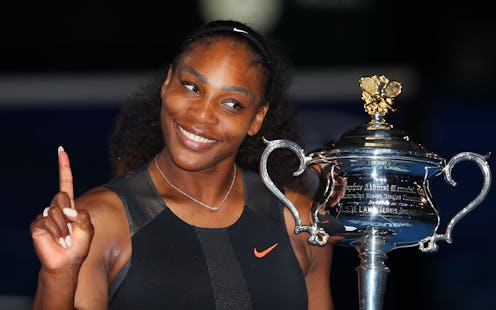Entertainment
Serena Williams' Definition Of “Power” Will Make You Rethink The Word, Too

Being great does not come easy. Greatness takes hard work, perseverance, sacrifice, and commitment. Yet, for black people, sometimes even being great just isn't enough — even for someone as distinguished as Serena Williams. In an interview with Vogue, Williams spoke about the realities she faces as a black woman in a predominately white sport. After experiencing years of blatant racism, as well as criticism about her outbursts, she said she's too familiar with the age-old concept of black people pushing themselves beyond their limits to simply gain the respect white people have by default in America.
The innumerable hardships that come with being black manifest themselves daily from microaggressions to police brutality. In order to not only overcome these obstacles but also reshape the narrative of black people as being less capable, many black parents teach their children that they must be twice as good to get half of what white people already have. These "haves" include the benefit of the doubt, understanding, patience, and second chances, while a black person may be subjected to ridicule for the slightest misstep.
Although Williams' unprecedented accomplishments in the world of tennis should speak for themselves, as a black woman she often has to defend her position as a physically capable athlete, as well as her personal character.
Williams told Vogue,
"I feel like people think I’m mean. Really tough and really mean and really street. I believe that the other girls in the locker room will say, 'Serena’s really nice.' But Maria Sharapova, who might not talk to anybody, might be perceived by the public as nicer. Why is that? Because I’m black and so I look mean? That’s the society we live in. That’s life. They say African-Americans have to be twice as good, especially women. I’m perfectly OK with having to be twice as good."
Although Williams has gone above and beyond to defy odds as an incomparable female athlete of color, the 35-year-old tennis champion noticed that throughout her ongoing quest for athletic excellence in tennis her take no prisoners, "Eye of the Tiger" on-court demeanor was often being misinterpreted as a menacing intimidation tactic. What's worse, she found that many assumed her game face reflected who she is as a person. But the Compton-born star is simply focused on being twice as good.
For someone like Williams to follow the rules, train hard, and win fair and square to still not be granted the respect she deserves says much more about her critics than it does about her. She will always be susceptible to scrutiny based on her race, gender, and celebrity no matter how successful she is because that's just the way it is. Yet Williams sees a benefit in working so hard. And no, it's not her trophies.
Williams is in tune with her power as a gamechanger. Being twice as good doesn't just mean training more hours or downplaying her abilities to appease society. In Williams' world, it means creating her own lane of excellence that no one else can enter.
"Not only me, but women in general sometimes feel that power is a bad word. As I've gotten older I've started to feel differently about it. Power is beauty. Strength is beauty. So now on the court I want people to think that I'm powerful. But I also want them to be shocked at how I play. I want people to expect something, then get something different."
Williams may not get the benefit of the doubt when she yells during a tennis match. She may not look demure or kind on the court. She certainly does not have white privilege. But she doesn't need it. The confidence she's found within herself to silence her critics speaks for itself. Serena Williams is a powerful, black woman who faces double standards, racism, and gender discrimination regularly. Thankfully, she's proving to the world that in the face of these adversities, she's an ace.